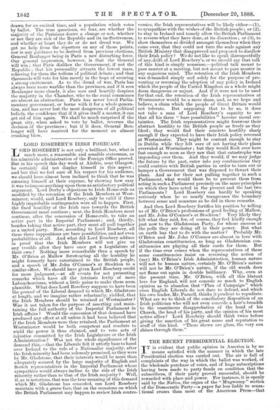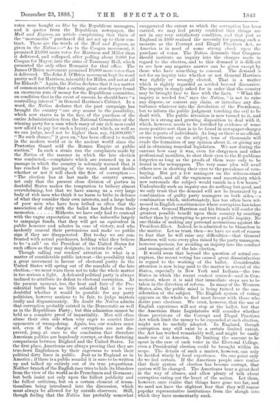THE RECENT PRESIDENTIAL ELECTION.
IT is evident that public opinion in America is by no means satisfied with the manner in which the late Presidential election was carried out. The air is full of complaints of the way in which the ballot was worked, of the wholesale purchase of votes, and of huge subscriptions having been made to party funds on condition that the subscribers, if their party proved successful, should be rewarded with place and power. For instance, it is openly said by the Nation, the organ of the " Mugwump " section of the Democratic Party—a paper far less liable to sensa- tional crazes than most of the American Press—that votes were bought en bloc by the Republican managers, and it quotes from the Republican newspaper, the Mail and Express, an article complaining that three of the " movements " purchased did not act up to their con- tract. These are the words of the Mail and Express, as given in the Nation :—" As to the Coogan movement, it promised 20,000 more votes for Harrison and Miller than it delivered, and collapsed, after polling about 9,000 for Coogan for Mayor, into the arms of Tammany Hall, which presented the only other Romanist for that office. The James O'Brien movement promised 10,000 more votes than it delivered. The John J. O'Brien movement kept its word pretty well for Harrison, miserably for Miller, and not at all for Erhardt." Again, the Nation declares that it is a matter of common notoriety that a certain great storekeeper found an enormous sum of money for the Republican committee, on condition that in the event of success, he should have " a controlling interest" in General Harrison's Cabinet. In a word, the Nation declares that the past campaign has brought the country "one step nearer to the possibility, which now stares us in the face, of the purchase of the entire Administration from the National Committee of the winning party for a sum which many of our rich men could now afford to pay for such a luxury, and which, as well as we can judge, need not be higher than, say, $4,000,000." "No such chance," it goes on, "has been offered to wealth in the modern world or in the ancient world since the PrEetorian Guard sold the Roman Empire at public auction." In such a strain run the complaints made by the Nation of the manner in which the late election was conducted,—complaints which are summed up in a passage in which the country is solemnly warned that it has reached the parting of the ways, and must decide whether or not it will check the flow of corruption :— " The election has at last made the country aware, not only that the present close division of parties in doubtful States makes the temptation to bribery almost overwhelming, but that we have among us a very large body of rich men who think it no harm to bribe in defence of what they consider their own interests, and a large body of poor men who have been bribed so often that the association of duty with the ballot has faded from their memories Hitherto, we have only had to contend with the vague expectation of men who subscribe largely to campaign funds, that they will get an equivalent in public honours and salaries in case of victory, and who modestly conceal their pretensions and make no public sign if they are disappointed. But to-day we are con- fronted with actual purchasers, holding what they believe to be a call' on the President of the United States for such offices as they may designate, in return for cash."
Though calling our readers' attention to what is a matter of considerable public interest—the possibility that a great movement in favour of electoral purity in the United States will spring out of the scandals of the late election,—we must warn them not to take the whole matter in too serious a light. A defeated political party is always inclined to attribute its defeat to electoral corruption. At the present moment, too, the heat and fury of the Pre- sidential battle has so little subsided that it is very doubtful whether it would be possible for any party politician, however auxious to be fair, to judge matters coolly and. dispassionately. No doubt the Nation admits that corruption probably existed in the Democratic as well as in the Republican Party ; but this admission cannot be held as a complete proof of impartiality. Men will often abuse their own side when very eager to convict their opponents of wrong-doing. Again, too, our readers must not, even if the charges of corruption are not dis- proved, jump at once to the conclusion that therefore American politics are hopelessly corrupt, or draw flattering comparisons between England and the United States. In the first place, Americans are always proving that they are true-born Englishmen by their eagerness to wash their political dirty linen in public. Just as in England so in America ; if there is a public scandal it is sure to be written up and talked up entirely out of its true proportions. Neither branch of the English race tries to hide its blunders from the view of the world as do Frenchmen and Germans ; but both insist not only upon the fullest publicity and the fullest criticism, but on a certain element of sensa- tionalism being introduced into the discussion, which must always be allowed for by outside observers. Still, though feeling that the Nation has probably somewhat exaggerated the extent to which the corruption has been carried, we may feel pretty confident that things are not in any very satisfactory condition, and that just as England in 1880 realised the necessity for passing such a, measure as the Corrupt and Illegal Practices Act, so America is in need of some strong check upon the purchase of votes. The Nation demands that Congress should institute an inquiry into the charges made in regard to the election, and to this demand it is difficult to see how any negative answer can be given except by those who have something to conceal. The demand is not for an inquiry into whether or not General Harrison was rightly or wrongly elected. That is a matter which is rightly regarded as settled beyond discussion. The inquiry is simply asked for in order that the country may be brought face to face with the facts. "What the inquiry is needed for," says the Nation, "is not to raise any dispute, or contest any claim, or introduce any dis- turbance whatever into the devolution of the Presidency, but to inform the public judgment touching the evil to be dealt with. The public attention is now turned to it, and there is a strong and growing disposition to deal with it, which, however, needs to be fortified by evidence of some more positive sort than is to be found in newspaper charges or the reports of individuals. As long as there is no official, sworn testimony on the subject, tens of thousands will evade the formation of any opinion about it, or giving any aid in obtaining remedial legislation. We saw during the canvass how easy it was, even for clergymen and other professional moralists, to shut their eyes to the Republican forgeries as long as the proofs of them were only to be found in the newspapers. The very same plea will avail others now in shutting their eyes to the prevalence of vote- buying. But get a few managers on the witness-stand under oath, and all the vagueness and uncertainty which now surrounds the subject would vanish in a few hours." Undoubtedly such an inquiry can do nothing but good, and we only trust that the demand will not be frustrated by a combination of guilty party managers on both sides,—a combination which, unfortunately, has too often been wit- nessed in English constituencies where corruption has taken deep root. General Harrison and his friends will confer the greatest possible benefit upon their country by courting rather than by attempting to prevent a public inquiry. No one thinks of making any personal accusations against the President-Elect. Indeed, he is admitted to be blameless in the matter. Let us trust, then—we have no sort of reason to fear that he will raise any difficulties—that General Harrison will veto every plea raised by the party managers, however specious, for avoiding an inquiry into the conduct and management of the late election.
It would seem that beyond the question of actual cor- ruption, the recent voting has caused great dissatisfaction in regard to the working of the ballot. Considerable attention is now being paid to the matter in several of the States, especially in New York and Indiana—the two States in which the recent contest centred—and in Con- necticut, where it is said that immediate steps are to be taken in the direction of reform. In many of the Western States, also, the public mind is being turned to the con- sideration of the subject. The English system of voting appears on the whole to find most favour with those who desire pure elections. We trust, however, that the use of English experience will not stop at the ballot, but that the American State Legislatures will consider whether those provisions of the Corrupt and Illegal Practices Act which limit the money to be expended at each election, might not be usefully adopted. In England, though corruption may still exist to a certain limited extent, the Act has worked remarkably well, and might be easily made use of in America. By limiting the amount to be spent in the case of each voter in the Electoral College, even a Presidential election could be brought within its scope. The details of such a matter, however, can only be decided wisely by local experience. On one point only do we feel certain. If the American people once realise that their system of election has become corrupt, that system will be changed. The Americans bear a great deal in the way of abuses, and allow plenty of talk about corruption eating out the heart of the nation. Let them, however, once realise that things have gone too far, and we need not have the slightest fear that they will rescue popular representative institutions from the slough into which they have momentarily sunk.



































 Previous page
Previous page